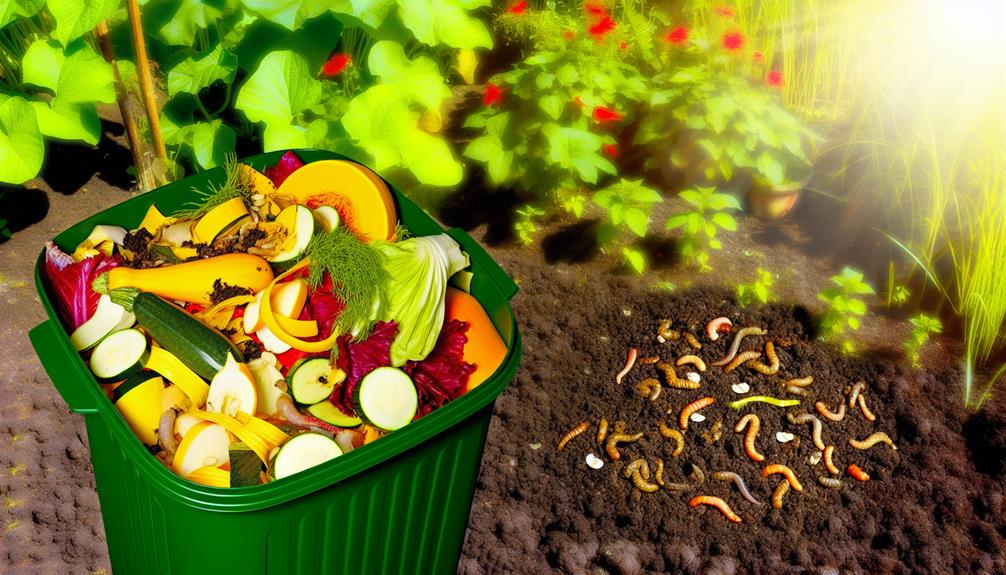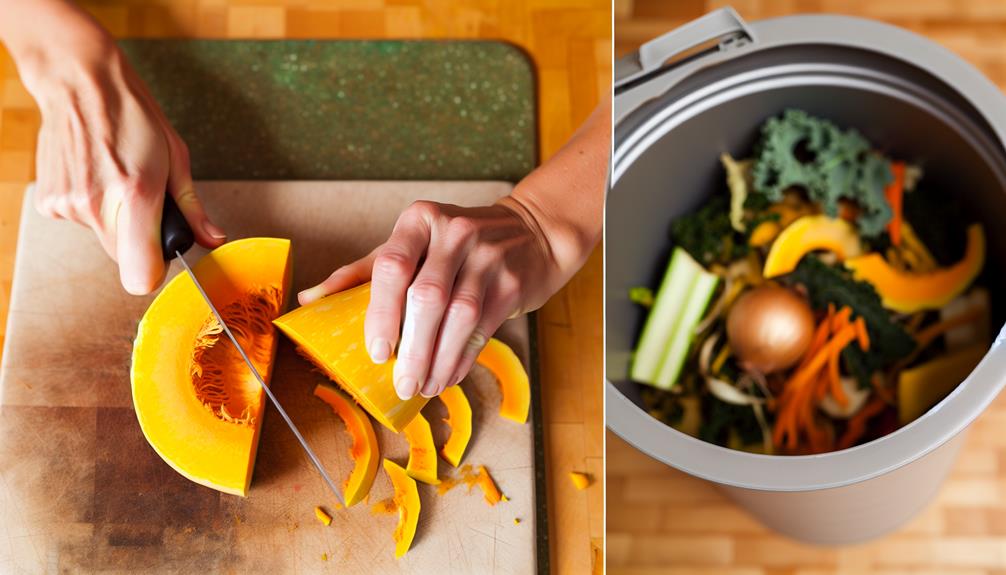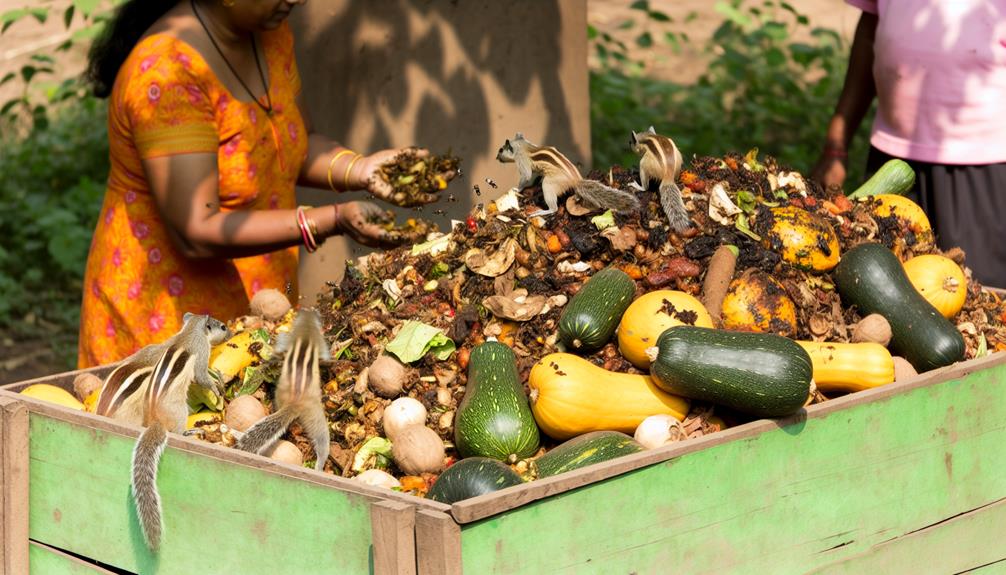

You can compost squash, both summer and winter varieties. Chop squash into small pieces for faster decomposition and remove seeds to prevent unwanted plant growth. Add squash to your compost pile, mixing with other compostable materials to balance nutrients.
Manage pests by burying squash deep and covering with soil. Regularly turn your compost and monitor moisture levels to avoid odors and pest infestations. Squash enriches compost with essential nutrients, improving soil fertility and plant growth. If curious about optimizing your composting process, and managing common challenges, there’s more practical advice ahead.
There are several types of squash you can compost, each with its unique characteristics. You’ll find that summer varieties and winter varieties both have a place in your compost heap. Knowing the differences between them can help you optimize your composting process.
Summer varieties, like zucchini and yellow squash, have thin skins and tender flesh. They break down quickly in a compost pile, adding moisture and nitrogen. You can chop them into smaller pieces to speed up decomposition. It’s best to mix summer varieties with other compost materials to balance the moisture content.
Winter varieties, such as butternut and acorn squash, have thicker skins and denser flesh. These take longer to decompose but are still excellent for composting. You might want to cut winter squash into smaller chunks or even peel them to accelerate the process. Their tough skins can provide structure to your compost heap, aiding in aeration.
When composting both types, always remember to mix them with a variety of other organic matter. This guarantees a balanced compost pile that breaks down efficiently. By understanding these squash varieties, you’ll be well-equipped to create nutrient-rich compost for your garden.
Also Read: Can You Compost Wood Scraps?
Composting squash offers significant benefits for your garden and the environment.
By composting squash, you enrich your soil with essential nutrients, promoting healthier plant growth.
Additionally, it helps reduce food waste, making your household more sustainable.
Adding composted squash to your garden enriches the soil with essential nutrients, promoting healthier plant growth. When squash decomposes, it breaks down into nutrient-rich organic matter that provides a significant nutrient boost to your garden.
This soil enrichment process improves the overall fertility, ensuring your plants get the nourishment they need to thrive.
To get started, gather your squash scraps, including peels, seeds, and pulp. Chop them into smaller pieces to speed up decomposition. Mix these scraps into your compost pile, ensuring a balance of green (nitrogen-rich) and brown (carbon-rich) materials.
Keep the compost moist and turn it regularly to maintain airflow, which helps the microorganisms break down the organic matter more efficiently.
Once the compost has fully decomposed, typically after a few months, spread it evenly over your garden soil. This layer of compost acts as a natural fertilizer, enhancing the soil structure and boosting its nutrient content.
Your plants will benefit from the improved soil quality, leading to stronger roots, better water retention, and increased resistance to pests and diseases.
Not only does composting squash enrich your soil, but it also greatly reduces food waste in your household. By incorporating squash into your compost bin, you’re engaging in food recycling, which helps transform kitchen scraps into valuable organic matter. This practice is a key component of sustainable living, aligning with efforts to minimize waste and reduce the burden on landfills.
When you compost squash, you’re not just discarding it. Instead, you’re transforming it into a resource that benefits your garden and the environment. Consider the following ways composting squash can reduce food waste:
| Action | Benefit |
|---|---|
| Composting kitchen scraps | Reduces landfill waste |
| Utilizing squash remains | Enhances compost quality |
| Implementing food recycling | Promotes sustainable practices |
| Minimizing food disposal | Decreases household waste output |
| Closing the nutrient loop | Improves garden health |
Also Read: Can You Compost Cauliflower Scraps?
Before tossing squash into your compost pile, take a few minutes to properly prepare it for best decomposition. Start with a good cutting technique to break down the squash into smaller pieces. This increases the surface area, allowing microbes to work more efficiently. Use a sharp knife and cut the squash into manageable chunks, aiming for pieces around 1-2 inches in size.

Next, focus on seed removal. Squash seeds can sprout in your compost, leading to unwanted plants. Scoop out all seeds using a spoon, ensuring you get every last one. If you’re feeling resourceful, you can roast the seeds for a healthy snack instead of discarding them.
After cutting and removing seeds, you can further chop the squash skin into smaller bits. The skin can be tougher to decompose, so making it smaller helps speed up the process. Additionally, you might consider softening the squash by letting it sit in the sun for a few hours or giving it a quick freeze and thaw. This makes it more accessible for composting organisms.
Also Read: Can You Compost Broad Beans?
When adding squash to your compost, make sure it’s properly prepared by chopping it into smaller pieces to speed up decomposition.
You’ll benefit from the nutrients squash adds to your compost, enriching your garden soil.
If you encounter issues like a bad smell or pests, troubleshoot by adjusting the moisture and balance of green and brown materials.
Wondering how to prepare squash for your compost to maximize its benefits? Start by gathering your cleaning tools. A scrub brush and water are essential for removing dirt and pesticides from the squash’s surface. Cleaning the squash helps keep unwanted chemicals and pests out of your compost pile, ensuring a healthier composting process.
Next, focus on your cutting techniques. Use a sharp knife to slice the squash into smaller pieces. Smaller chunks decompose faster, promoting efficient breakdown in your compost. Aim for pieces that are about one to two inches in size. This size strikes a balance between rapid decomposition and ease of handling.
Don’t forget the seeds and skins. These parts of the squash can go into the compost too. Just make sure to spread them evenly throughout your compost pile to prevent clumping, which can slow down the decomposition process.
Mixing the squash pieces with other compostable materials, like leaves and grass clippings, will help maintain a balanced compost pile.
Adding squash to your compost provides a rich source of nutrients that can greatly enhance the quality of your final compost. Squash breaks down quickly, adding essential elements like nitrogen, phosphorus, and potassium to the mix. This not only boosts plant growth but also improves soil structure and fertility.
Here are four key benefits of adding squash to your compost:
To guarantee your compost thrives, it’s crucial to address some common issues that may arise when adding squash. One problem you might encounter is a rotten odor. This typically happens if there’s too much moisture or not enough aeration. To fix it, balance the green and brown materials. Add dry leaves or shredded paper to absorb excess moisture and turn the pile regularly to enhance airflow.
Another issue is pest infestation. Squash can attract unwanted visitors like flies and rodents if not managed correctly. To prevent this, chop the squash into smaller pieces before adding it to the compost. Bury it deep within the pile to limit exposure. Cover the compost with a layer of soil or brown materials to deter pests further.
Additionally, make sure your compost maintains a proper temperature. Squash, being rich in nutrients, can generate heat. Turn the compost frequently to distribute heat evenly and accelerate decomposition.
When composting squash, one common challenge is managing the moisture level to prevent a soggy compost pile. Squash can add a lot of water to your compost, leading to an imbalance. Proper moisture management is crucial to maintaining a healthy compost pile and avoiding common issues like pest infestations and unpleasant odors.

Here are some strategies to tackle these challenges:
Also Read: Can You Compost Cedar Chips?
Managing moisture is just one part of the equation; there are several other techniques you can use to speed up the decomposition process in your compost pile. Start with a well-structured compost bin. A good bin maintains the right balance of green and brown materials, ensuring ideal microbial activity.
Chop or shred your squash and other compostable materials into smaller pieces. Smaller pieces decompose faster because they’ve more surface area for microbes to work on.
Aeration techniques are essential. Turn your compost pile regularly to introduce oxygen, which accelerates decomposition. Use a pitchfork or a compost aerator tool to make this task easier. Ensuring proper aeration helps maintain aerobic conditions that are necessary for efficient composting.
Temperature control also plays a significant role. Keep your compost pile warm, ideally between 135°F to 160°F. You can achieve this by adding materials in layers and covering the pile with a tarp. This helps retain heat and moisture.
Lastly, monitor and maintain a balanced carbon-to-nitrogen ratio. Aim for a mix of about 30 parts carbon to 1 part nitrogen. With these tips, your squash and other compostables will break down more quickly, enriching your compost bin with nutrient-rich organic matter.
You can compost squash seeds, but removing them first is preferable. If left in, seed germination may occur. By removing seeds, you’ll guarantee top-notch nutrient content in your compost, creating a richer, more balanced mix for everyone.
You’re curious about squash’s decomposition rate in a compost pile. Generally, this organic material takes 2-3 months to break down completely, provided your compost stays moist and well-turned. You’re doing great for the environment!
Yes, squash in compost can attract pests like rodents and insects. However, you can utilize pest deterrents and guarantee proper compost aeration to minimize these issues. This way, you’ll keep your compost healthy and community-friendly.
Yes, you can compost moldy or rotten squash. Their nutrient content enriches your compost and speeds up the decomposition process. Don’t worry, you’re contributing to a healthier garden and fostering a sense of community with nature.
Squash vines and leaves do compost differently than the fruit. They break down faster, enriching your compost with nutrients. However, they can harbor plant diseases, so be cautious and verify they’re disease-free before adding them.
By composting squash, you’re efficiently recycling organic waste and enriching your soil.
Make sure to chop the squash into smaller pieces and mix it well with other compost materials.
Keep an eye on moisture levels and turn the pile regularly for faster decomposition.
Be patient, as some squash parts might take longer to break down.
With proper care, your compost will thrive, providing valuable nutrients for your garden.
